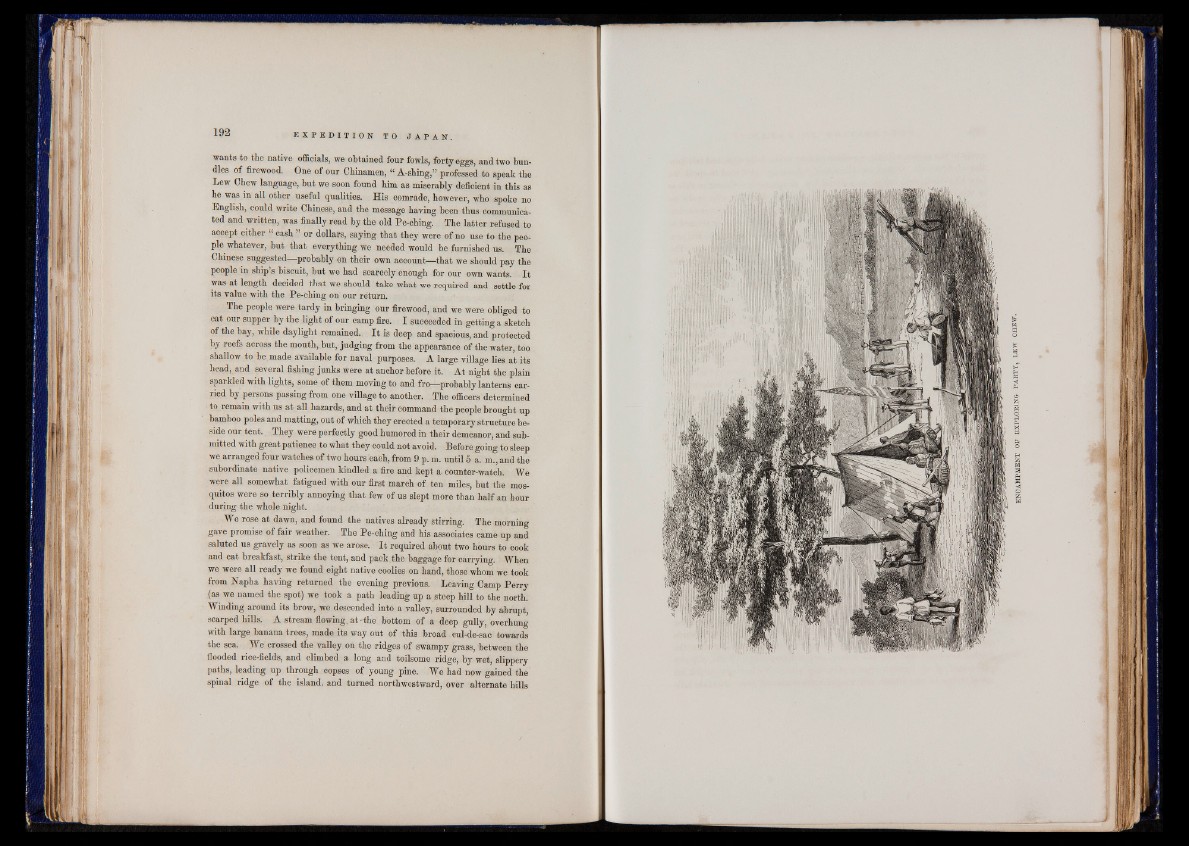
wants to the native officials, we obtained four fowls, forty eggs, and two bundles
of firewood. One of our Chinamen, “ A-shing,” professed to speak the
Lew Chew language, but we soon found him as miserably deficient in this as
he was in all other useful qualities. His comrade, however, who spoke no
English, could write Chinese, and the message having been thus communicated
and written, was finally read by the old Pe-ching. The latter refused to
accept either “ cash ” or dollars, saying that they were of no use to the people
whatever, but that everything we needed would be furnished us. The
Chinese suggested—probably on their own account—that we should pay the
people in ship’s biscuit, but we had scarcely enough for our own wants. - I t
was at length decided that we should take what we required and settle for
its value with the Pe-ching on our return.
The people were tardy in bringing our firewood, and we were obliged to
eat our supper by the light of our camp fire. I succeeded in getting a sketch
of the bay, while daylight remained. I t is deep and spacious, and protected
by reefs across the mouth, but, judging from the appearance of the water, too
shallow to be made available for naval purposes. A large village lies at its
head, and several fishing junks were at anchor before it. At night the plain
sparkled with lights, some of them moving to and fro—probably lanterns carried
by persons passing from one village to another. The officers determined
to remain with us at all hazards, and at their command the people brought up
bamboo poles and matting, out of which they erected a temporary structure beside
our tent.. They were perfectly good humored in their demeanor, and submitted
with great patience to what they could not avoid. Before going to sleep
we arranged four watches of two hours each, from 9 p. m. until 5 a. m., and the
subordinate native policemen kindled a fire and kept a Counter-watch. We
were all somewhat fatigued with our first march of ten miles, but the mosquitos
were so terribly annoying that few of us slept more than half an hour
during the whole night.
We rose at dawn, and found the natives already stirring. The morning
gave promise of fair weather. The Pe-ching and his associates came up and
saluted us gravely as soon as we arose. I t required about two hours to cook
and eat breakfast, strike the tent, and pack the baggage for carrying. When
we were all ready we found eight native coolies on hand, those whom we took
from Napha having returned the evening previous. Leaving Camp Perry
(as we named the spot) we took a path leading up a steep hill to the north.
Winding around its brow, we descended into a valley, surrounded by abrupt,
scarped hills. A stream flowing.at-the bottom of a deep gully, overhung
with large banana trees, made its way out of this broad cul-de-sac towards
the sea. We crossed the valley on the ridges of swampy grass, between the
flooded rice-fields, and climbed a long and toilsome ridge, by wet, slippery
paths, leading up through copses of young pine. We had npw gained the
spinal ridge of the island, and turned northwestward, over alternate hills